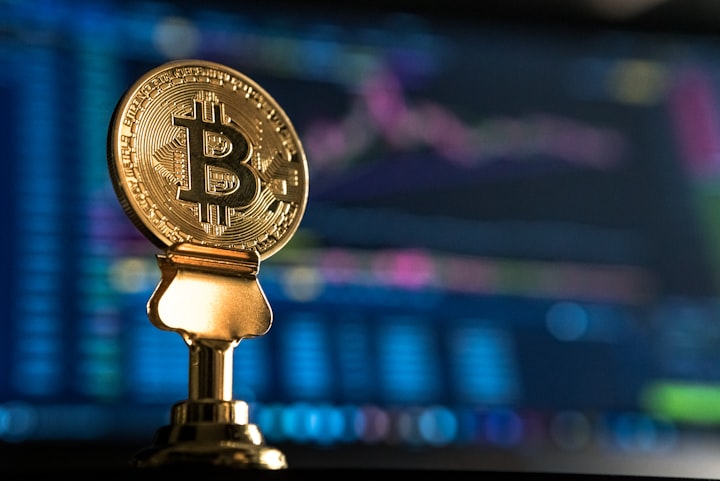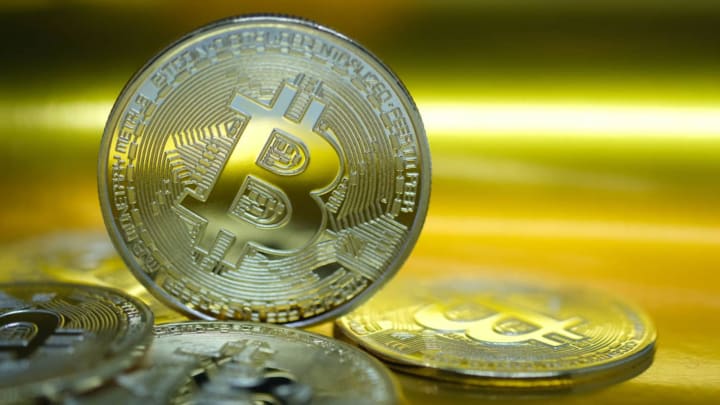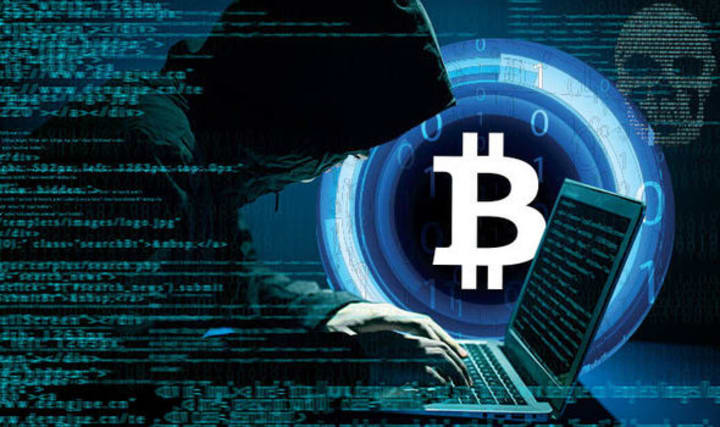
BITCOIN is a cryptocurrency invented in 2008 by an unknown person who used his name as Satoshi Nakamota. It is a decentralized digital currency, without a central bank or single administrator, that can be sent from user to user on the peer-to-peer bitcoin network without the need for intermediaries.

Transactions are verified by network nodes through cryptography and recorded in a public distributed ledger called a blockchain. Bitcoins are created as a reward for a process known as mining. They can be exchanged for other currencies, products, and services, but the real-world value of the coins is extremely volatile. Research produced by the University of Cambridge estimated that in 2017, there were 2.9 to 5.8 million unique users using a cryptocurrency wallet, most of them using bitcoin.
Users choose to participate in the digital currency for a number of reasons: ideologies such as commitment to anarchism, decentralization and libertarianism, convenience, using the currency as an investment and pseudonymity of transactions. Increased use has lead to a desire among governments for regulation, in order to tax, facilitate legal use in trade and other reasons.

Similar to bitcoin there are lot more cryptocurrencies today in this world and more are creating every day. All these cryptocurrencies other then bitcoin are known as ALTCOINS(like Ethereum, cardano, binance coin, polkadot etc.)
The biggest exchange for crypto trading today is Binance . it is a centralized exchange which offers you to trade in various cryptos. it is the most favorite exchange of most of the crypto traders.

Currently bull run is going on if you do not want to miss this bull run out because we do not when will next bull run come. Elon Musk has also joined Cryto as his company tesla has recently bought more than $1.5 billion worth of bitcoins.
:-If you have heard about Bitcoin (BTC) it cannot have that you f=have not heard about bitcoin mining. So it is al you can know about bitcoin.
Bitcoin mining is the process by which bitcoins are released into circulation. Generally, mining requires the solving of computationally difficult puzzles in order to discover a new block, which is added to the blockchain.
Bitcoin mining adds and verifies transaction records across the network. For adding blocks to the blockchain, miners are rewarded with a few bitcoins; the reward is halved every 210,000 blocks. The block reward was 50 new bitcoins in 2009. On May 11th, 2020, the third halving occurred, bringing the reward for each block discovery down to 6.25 bitcoins.4
A variety of hardware can be used to mine bitcoin. However, some yield higher rewards than others. Certain computer chips, called Application-Specific Integrated Circuits (ASIC), and more advanced processing units, like Graphic Processing Units (GPUs), can achieve more rewards. These elaborate mining processors are known as "mining rigs."
One bitcoin is divisible to eight decimal places (100 millionths of one bitcoin), and this smallest unit is referred to as a Satoshi.5 If necessary, and if the participating miners accept the change, bitcoin could eventually be made divisible to even more.
Now as you know about bitcoin and know it has good scope to increase your wealth but be aware before investing in it and know about the risks involved in investing in bitcoin.

#Types of Risks Associated With Bitcoin Investing
Although Bitcoin was not designed as a normal equity investment (no shares have been issued), some speculative investors were drawn to the digital currency after it appreciated rapidly in May 2011 and again in November 2013. Thus, many people purchase bitcoin for its investment value rather than its ability to act as a medium of exchange.
However, the lack of guaranteed value and its digital nature means the purchase and use of bitcoins carries several inherent risks. Many investor alerts have been issued by the Securities and Exchange Commission (SEC), the Financial Industry Regulatory Authority (FINRA), the Consumer Financial Protection Bureau (CFPB), and other agencies.
The concept of a virtual currency is still novel and, compared to traditional investments, bitcoin doesn't have much of a long-term track record or history of credibility to back it. With their increasing popularity, bitcoins are becoming less experimental every day; still, after only a decade, all digital currencies still remain in a development phase. "It is pretty much the highest-risk, highest-return investment that you can possibly make,” says Barry Silbert, CEO of Digital Currency Group, which builds and invests in Bitcoin and blockchain companies.
Regulatory Risk
Investing money into bitcoin in any of its many guises is not for the risk-averse. Bitcoins are a rival to government currency and may be used for black market transactions, money laundering, illegal activities, or tax evasion. As a result, governments may seek to regulate, restrict, or ban the use and sale of bitcoins (and some already have). Others are coming up with various rules.
For example, in 2015, the New York State Department of Financial Services finalized regulations that would require companies dealing with the buy, sell, transfer, or storage of bitcoins to record the identity of customers, have a compliance officer, and maintain capital reserves. The transactions worth $10,000 or more will have to be recorded and reported.
The lack of uniform regulations about bitcoins (and other virtual currency) raises questions over their longevity, liquidity, and universality.
Security Risk
Most individuals who own and use bitcoin have not acquired their tokens through mining operations. Rather, they buy and sell bitcoin and other digital currencies on any of a number of popular online markets, known as bitcoin exchanges.
Bitcoin exchanges are entirely digital and, as with any virtual system, are at risk from hackers, malware, and operational glitches. If a thief gains access to a bitcoin owner's computer hard drive and steals their private encryption key, they could transfer the stolen bitcoin to another account. (Users can prevent this only if bitcoins are stored on a computer that is not connected to the internet, or else by choosing to use a paper wallet—printing out the bitcoin private keys and addresses, and not keeping them on a computer at all.

Hackers can also target bitcoin exchanges, gaining access to thousands of accounts and digital wallets where bitcoins are stored. One especially notorious hacking incident took place in 2014, when Mt. Gox, a bitcoin exchange in Japan, was forced to close down after millions of dollars worth of bitcoins were stolen.
This is particularly problematic given that all Bitcoin transactions are permanent and irreversible. It's like dealing with cash: Any transaction carried out with bitcoins can only be reversed if the person who has received them refunds them. There is no third party or a payment processor, as in the case of a debit or credit card—hence, no source of protection or appeal if there is a problem.
Insurance Risk
Some investments are insured through the Securities Investor Protection Corporation. Normal bank accounts are insured through the Federal Deposit Insurance Corporation (FDIC) up to a certain amount depending on the jurisdiction.
Generally speaking, bitcoin exchanges and bitcoin accounts are not insured by any type of federal or government program. In 2019, prime dealer and trading platform SFOX announced it would be able to provide bitcoin investors with FDIC insurance, but only for the portion of transactions involving cash.
Fraud Risk
While bitcoin uses private key encryption to verify owners and register transactions, fraudsters and scammers may attempt to sell false bitcoins. For instance, in July 2013, the SEC brought legal action against an operator of a bitcoin-related Ponzi scheme. There have also been documented cases of bitcoin price manipulation, another common form of fraud.
Market Risk
Like with any investment, bitcoin values can fluctuate. Indeed, the value of the currency has seen wild swings in price over its short existence. Subject to high volume buying and selling on exchanges, it has a high sensitivity to any newsworthy events. According to the CFPB, the price of bitcoins fell by 61% in a single day in 2013, while the one-day price drop record in 2014 was as big as 80%.15
If fewer people begin to accept bitcoin as a currency, these digital units may lose value and could become worthless. Indeed, there was speculation that the "bitcoin bubble" had burst when the price declined from its all-time high during the cryptocurrency rush in late 2017 and early 2018.
There is already plenty of competition, and although bitcoin has a huge lead over the hundreds of other digital currencies that have sprung up because of its brand recognition and venture capital money, a technological break-through in the form of a better virtual coin is always a threat.






Comments
There are no comments for this story
Be the first to respond and start the conversation.